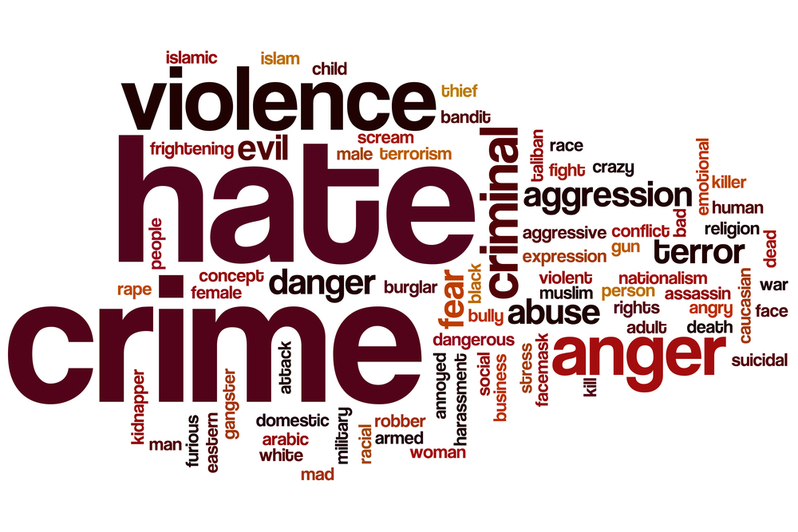

In April 2019, a 21-year-old man was arrested and charged with the burnings of three African American churches in Louisiana. The suspect, Holden Matthews, is white.
Not only did state prosecutors file charges against the suspect for arson, but they also added an additional charge by declaring the arsons a hate crime. Federal officials also announced that they would consider filing federal hate crimes charges against Matthews, while the arson attacks were also sharply criticized by state political leaders. Gov. John Bel Edwards declared that the church burnings were a reminder “of a very dark past of intimidation and fear.”
Hate crimes are a special charge that targets criminal acts believed to be inspired by prejudice, with acts of violence or intimidation directed at specific ethnic, racial or religious groups. Each state has its own definition of what constitutes a hate crime, including Louisiana. To better understand how the Pelican State defines a crime motivated by hate, let’s take a closer look at how Louisiana’s hate crimes laws have evolved.
What are Hate Crimes Laws in the U.S.?
Hate crimes laws date back to the 1960s, when lawmakers began exploring ways to fight criminal acts inspired by bias. These laws condemn prejudice and aim to protect citizens, particularly minority groups, from criminal behavior that violates the principles of equality and anti-discrimination laws. The term “hate crime” eventually became a major political topic in the 1980s when Congress introduced the Hate Crime Statistics Act, requiring the U.S. Department of Justice to collect and publish statistics on crimes motivated by racial, religious, or ethnic prejudice.
Since then, hate crime laws have been adopted by the federal government and most states. Today, the FBI defines hate crimes as:
“Traditional offense[s], like murder, arson, or vandalism with an added element of bias.”
When prosecuting hate crimes, prosecutors look at two things:
- The crime committed by the suspect
- The motivation behind the crime, and whether the offender was motivated to commit it out of hatred or prejudice
What Do The Hate Crimes Laws in Louisiana Say?
Louisiana lawmakers approved the state’s first hate crimes law in 1997. A person can be charged with committing a hate crime if it can be proven they targeted their victim’s or their victim’s property based on hate or prejudice due to the victim’s:
- Race
- Age
- Gender
- Religion
- Creed
- Disability
- Sexual orientation
- National origin
- or ancestry
The issue isn’t that the victim was a member of one of these groups, but rather that the suspect targeted the victim because he or she was one of those groups.
In 2016, Louisiana lawmakers expanded the definition of a hate crime to include the Blue Lives Matter amendment, making it illegal to target someone who is:
- A law enforcement officer
- Firefighter
- or emergency medical services personnel.
Gov. Edwards, whose brother and father served as law enforcement officers, signed the new version into law while calling police officers “true heroes and deserve every protection that we can give them. The overarching message is that hate crimes will not be tolerated in Louisiana.”
The bill also increased the penalty of five years in prison and up to a $5,000 fine for anyone who commits a felony hate crime.
Are the Penalties for Hate Crimes in Louisiana Serious?
Anyone convicted of a Louisiana hate crime has likely also been charged with a crime such as assault and battery, arson, or even murder, and you face an additional sentencing on the hate crimes charge. The most serious types of hate crimes are those involving violence.
In Louisiana, hate crimes are a very serious charge not to be taken lightly, and it’s important to immediately consult with an experienced criminal defense lawyer.
Secure Quality Criminal Defense in Louisiana
If you’re facing a hate crime charge in Louisiana, it’s important to get an experienced criminal defense attorney on your side. In Louisiana, a top source for criminal defense attorneys is the John D. & Eric G. Johnson Law Firm. We have more than 25 years of experience representing ordinary citizens just like you and want to help you get your life back on the right track. It’s our mission to give you the most personalized experience possible and help you have your voice heard.
Eric Johnson is respected throughout Louisiana and is known for providing solid representation that wins cases. To schedule a free consultation regarding your case, call our office at 318-377-1555 or contact us online today. We’re here to represent you! 318-377-1555 or contact us online today. We’re here to represent you!
